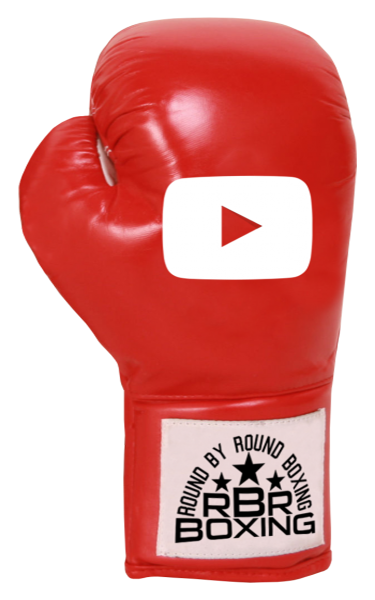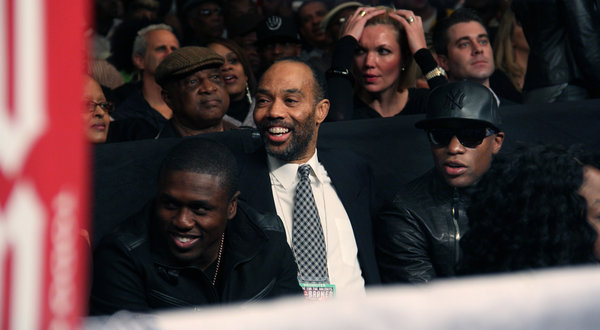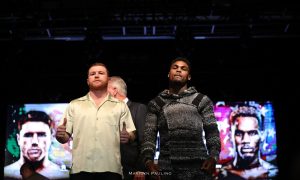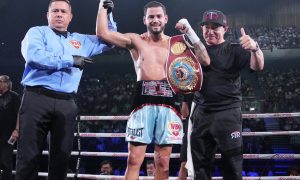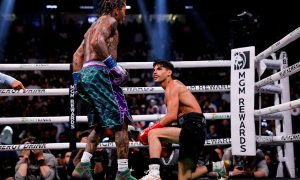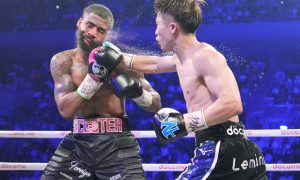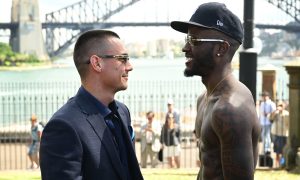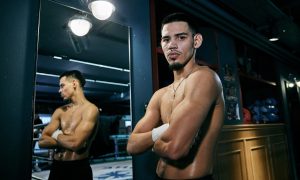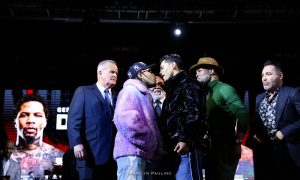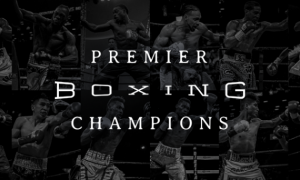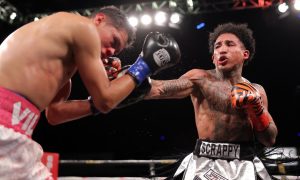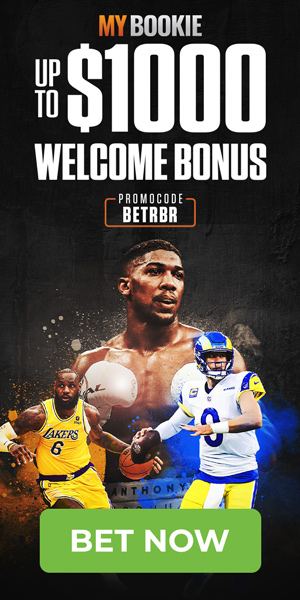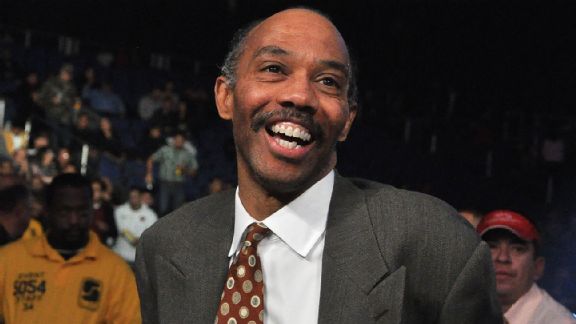 Photo by Ramiro Cairo for ESPN
Photo by Ramiro Cairo for ESPN
Al Haymon is somewhat of a mythical character to the sport boxing and its followers. Much like the title art for Mario Puzo’s novel and its movie adaption, The Godfather, Haymon is like the hand behind (or above) the curtain manipulating strings that connect to the many facets of the sweet science.
Haymon has been referred to as a “ghost” or the Wizard of Oz because he avoids media the same way most people avoid restrooms at a gas station. He is building an empire without any social media or internet presence–not even a company website–in the age of information. The fact that Haymon has cultivated such a prominent role in the sport, despite his obscurity, has the fight game questioning: Is Al Haymon good for boxing?
To answer that question objectively, we should get to know Haymon first. Alan Haymon is a Harvard educated businessman from Cleveland, OH, with a Masters in economics. He made his name by promoting major music artists spanning from Whitney Houston, M.C. Hammer and the O’Jay’s to more contemporary artists like Jodeci , TLC and Mary J. Blige. He was a figurehead behind the legendary traveling music festival called the Budweiser Super Fest that ran for 20 years from 1979 to 1999, before reemerging in 2010 as the “Summer Block Party.”
Haymon has been consistently successful with his business ventures, well, except for that failed Family Matters spin-off on UPN based on everyday life around an adult, newlywed Steve and Laura Urkel. Yes, that was real and Haymon was behind it.
In 2006, Haymon entered into the boxing world when he began managing a top prospect from Atlanta named Vernon Forrest. That same year, another young champion showing star potential by the name of Floyd Mayweather began contacting Haymon. Haymon started to advise Mayweather on his career and helped Floyd sever ties with his promotional banner at the time, Top Rank. As their business relationship grew, Haymon became a main catalyst in turning Mayweather, an African American fighter of a lighter weight class with a style typically unsatisfying to most boxing fans, into the highest earning athlete in the world.
Since we’ve covered his background, let’s look at the reasons why Haymon might not be good for boxing. Remember when Andre Berto was the WBC champion at welterweight and was scheduled to fight Shane Mosley in a unification bout back in January 2010? This timeline is significant to the fans’ criticism of Haymon.
Berto is Haitian American with family that still lives there today. In late 2009, Haiti was ravaged by a major earthquake, prompting Berto’s withdrawal from the fight with Mosley on short notice. Mosley rebounded from the pull out by landing the fight he originally wanted with Floyd Mayweather. After providing relief efforts in Haiti, Berto returned to the ring facing a faded Carlos Quintana. He knocked Quintana out in front of a near vacant Bank Atlantic Center, making over 1.5 million for his troubles. Everyone involved benefited from this situation, other than the fans looking for Berto to fight a more notable opponent in his return to the ring as the WBC’s world champion at 147 pounds.
Mosley, Mayweather and Berto would all contend that Haymon went above and beyond what is required, and that they were pleased. Boxing fans and media…not so much. This is the biggest complaint against Haymon; that he is responsible for negotiating some of the most asymmetrical matchups in favor of his fighters in recent years. We’ve seen that recently with Danny Garcia (managed by Haymon), when he faced the severely outmatched Rod Salka. Salka didn’t even break the top 20 rankings for that weight class and was brutally knocked out.
We’ve also been seeing this lately with fan favorite Leo Santa Cruz, also managed by Haymon. Santa Cruz has been running through a stretch of less-than-stellar matchups, such as his fight against the battle-worn Cristian Mijares and a few guys with virtually no notoriety, like Manuel Roman and Jesus Ruiz. Fans have been demanding a clash with fellow title holder, Guillermo Rigondeaux, or any of the top 122 pounders like Carl Frampton and Scott Quigg. Fans also question why the possibility of a move up to featherweight to face the top guys there like Abner Mares, Nicholas Walters and Vasyl Lomanchenko, etc. hasn’t been explored.
It is not only the fans, however, that have beef with Haymon’s methods. Haymon operates as a hybrid between manager and promoter. While there are no prerequisites for being an advisor, Haymon is licensed as manager; but he also provides much of the functionality that a promoter would as well. This is problematic based on the controversial Muhammad Ali Boxing Reform Act passed in May 2000. The act forces the segregation in the roles of managers and promoters; amongst the many other stipulations it contains–in order to protect the fighters (I wonder how Jermain Taylor and Magomed Abdusalamov feel that’s working out for them).
The way the Muhammad Ali Act is intended to be applied is that promoters secure the venue, pay insurance and take all financial risks; while managers are devoted to their fighter, as opposed to the event card as a whole. In theory, these two roles should neutralize each other in favor of the fighters who, in principal, sell the fight. Prizefighters definitely need certain protections from opportunists who promote and manage them (think Mike Tyson and Don King’s situation).
Many rival promoters’ issue with Haymon is that he functions like a promoter without being held to the regulations laid out in the Muhammad Ali Act. Some pundits and promoters speculate that these criticisms are fueled by envy more so than the actual sake of the fighter, because Haymon has one of the best reputations among prizefighters. His reputation is what has allowed him to acquire such great fighters, and continue to attract so many clients.
With all of these criticisms discussed, you may be asking yourself if there are any redeeming qualities about Haymon’s influence and work.
Of course there are. As noted earlier, Haymon has a large and growing stable of fighters. This is a clear reflection of the reputation that Haymon has built with his fighters. He’s notorious in boxing for getting his fighters the most money possible, even if the risk factor of the fight doesn’t necessarily match the purse. That is great for the fighters. The sweet science is rarely sweet to those who participate, so why shouldn’t they get as much as they can before it’s all said and done?
Furthermore, Haymon is bringing boxing back to network television. This is the best possible scenario in the boxing landscape as far as exposure goes. Just a few years ago, many casual boxing fans would swear that boxing was dead. This proves the exact opposite and in the best case scenario, could place boxing near the top of American professional sports as it once was in the 60’s and 70’s, based on the impact of ABC’s Wide World of Sports boxing coverage, by captivating American audiences.
From the relationship with Howard Cosell, the coverage during his exile, to his return; Wide World of Sports elevated Muhammad Ali’s persona, outside of his own promotional prowess. A young Ray Leonard was inspired to pick up a pair of boxing gloves based on Ali’s appearance on Wide World of Sports. The show even made fighters in lower weight classes, like Ray “Boom Boom” Mancini, a household name in America. Al Haymon is looking to create a similar or even larger impact with his Premier Boxing Champions series.
After brokering an enormous 20-fight deal with NBC that will bring boxing back to millions of viewers via network television, Haymon followed up the consecutive week with another deal announced by Spike TV to host several fights on their basic cable television network as well as CBS which will host its first PBC card on April 4 in Quebec City, with light heavyweight champion Adonis Stevenson (25-1, 21 KOs) taking on Sakio Bika (32-6-3, 21 KOs). These three major deals that were announced will definitively change boxing and its landscape in the immediate future. Also, on March 1, it was announced that another deal has been struck with with the lesser known, Bounce TV out of Atlanta, GA, to host PBC cards.
Looking at the matchups on the announced cards for the Premier Boxing Champions or “PBC ” series that will be featured throughout 2015 on NBC networks and Spike TV, this is definitely a win-win (despite how the actual fights go) for everyone, especially the fans.
With quality matchups for NBC like this weekend’s first installment, featuring Keith Thurman (24-0,21 KOs) vs. Robert Guerrero (32-2-1, 18 KOs), Adrien Broner (29-1, 22 KOs) vs. John Molina (27-5, 22 KOs) and a Junior Welterweight bout between Lamont Peterson and Danny Garcia slated for the next broadcast; while Spike TV’s first card boasts Andre Berto (29-3, 22 KOs) vs. Josesito Lopez (33-6, 19 KOs) and co-features Shawn Porter (24-1-1, 15 KOs) vs. Roberto Garcia (36-3, 23 KOs), it seems that 2015 might be the year of the boxing fan.
In conclusion, my answer to the question, “Is Al Haymon good for boxing,” the answer is emphatically yes–for now.
That could change in the future, but with Haymon launching a major initiative to bring boxing back to cable and network television, coupled with the large stable of fighters at his fingertips in terms of matchmaking; this could be one of the best efforts in recent times to revitalize the sport and propel it closer to being as popular as it once was over 30 years ago.
We will just have to trust boxing’s Wizard of OZ as Dorothy did in order to bring boxing back home. As PBC premieres tonight, I will be clicking my heels in hopes that this is the start of boxing’s journey home.
http://www.wedgies.com/question/54fb6f4268b2861300001064



